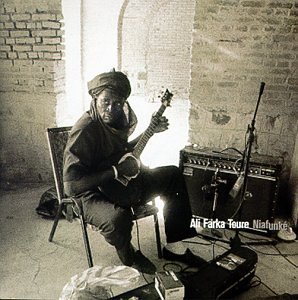Essential World Music Records #1: Ali Farka Touré - "Niafunké"

Before Ry Cooder started the Cuban boom thru the Buena Vista Social Club project, he had already recorded "
Talking Timbuktu
" with Ali Farka Touré. Artistically "
Talking Timbuktu
" represented the definitive affirmation of a Malian blues man that from then on, intensified the number of shows worldwide, in personal terms however it meant a drift from values that he considered more important.
Ali Farka Touré was never happy with the show business life, many were the times that Touré thought of abandoning his life as musician. This sentiment is reflected in his last rare live appearances outside their natural environment: the village of Niafunké, on the edge of the Sahara Desert, around the Niger River, where there is no electricity or running water. There, Ali Farka Touré, father of 11 and 60 years old, has put the cultivation of the land above the music, investing all the money earned from this activity in agricultural machinery. He felt a certain discomfort in his successive world tours for losing the essence of his roots, it would be inevitable to record Niafunké the 'place of origin of this music - deep Mali', recorded by a mobile studio fed by a generator.
"Niafunké" is probably the greatest album of the life of Ali Farka Touré and a serious candidate to best world album of the 90s. In "
Talking Timbuktu
" the production of Ry Cooder created a greater range of sounds that helped build the great songs sweetened for western ears; in "
Niafunké
" we see the return to land and sound of the first recordings that "
Radio Mali
" (96) document. "
Niafunké
" is the return of someone who matured his musical vision on a global stage and works the land every day. "
Niafunké
" may not have songs as melodic as "Talking Timbuktu", but gains in authenticity that is reflected not only in Toure's most audacious guitar playing, as the musicians accompanying him. The warm female choruses, the rhythms of the turbulent calabash, the djembe and congas to remind Oumou Sangare, the sound of Njarka 's trance, lead us into a journey of devotion and drunkenness and giving us all the purity of deep Mali, where the blues were born.

No comments:
Post a Comment